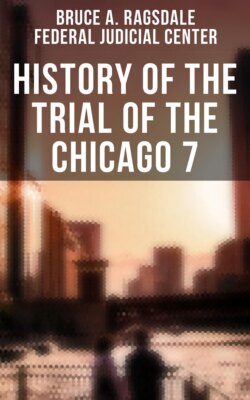Читать книгу History of the Trial of the Chicago 7 - Bruce A. Ragsdale - Страница 10
На сайте Литреса книга снята с продажи.
Indictment
ОглавлениеTable of Contents
John Mitchell, the new U.S. Attorney General appointed by President Nixon following his inauguration in January 1969, worked with the U.S. attorney’s office in Chicago to strengthen draft indictments of demonstrators, and Department of Justice officials asked U.S. Attorney Thomas Foran, a political ally of Mayor Daley, to remain in office and direct the prosecution. On March 20, 1969, the grand jury indicted eight demonstrators and eight policemen. Seven policemen were charged with assaulting demonstrators and the eighth policeman was charged with perjury.
The indicted demonstrators, soon known as the “Chicago Eight,” were charged with conspiring to use interstate commerce with intent to incite a riot. Six of the defendants—David Dellinger, Rennie Davis, Tom Hayden, Abbie Hoffman, Jerry Rubin, and Bobby Seale of the Black Panther Party—were also charged with crossing state lines with the intent to incite a riot. The other two defendants, academics John Froines and Lee Weiner, were charged with teaching demonstrators how to construct incendiary devices that would be used in civil disturbances. If convicted of all charges, each of the defendants faced up to ten years in prison. The case entered the court record as United States v. Dellinger et al. These were the first prosecutions under the anti-riot provisions of the Civil Rights Act of 1968.
It was an unlikely group to engage in conspiracy. Dellinger, at 54, had been active in pacifi st movements for years before the rise of the student protests of the 1960s. Hayden and Davis were skilled organizers with focused political goals, and they had never been interested in the street theater and cultural radicalism of Hoffman and Rubin. John Froines and Lee Weiner were only marginally involved in the planning for the demonstrations, and their participation during the convention differed little from that of hundreds of others. The unlikeliest conspirator was Bobby Seale, who had never met some of the defendants until they were together in the courtroom and who had appeared in Chicago briefl y for a couple of speeches during the convention. Seale was one of the founders of the Black Panther Party, which federal and state prosecutors had recently targeted in numerous prosecutions around the country.
The eight were linked less by common action or common political goals than by a shared radical critique of U.S. government and society. Rennie Davis thought the government “lumped together all the strands of dissent in the sixties,” and Tom Hayden concluded that the government had “decided to put radicalism on trial.” On the witness stand, Abbie Hoffman dismissed the idea of any conspiracy among the eight defendants, adding, “we couldn’t even agree on lunch.”
